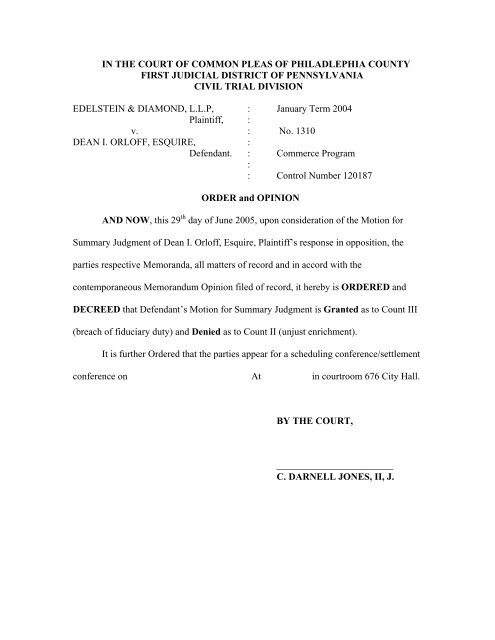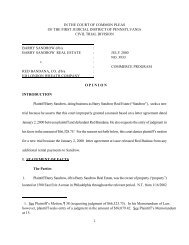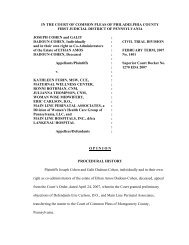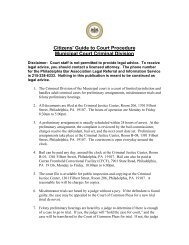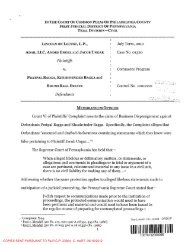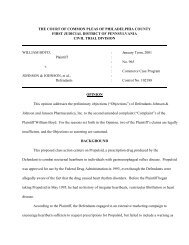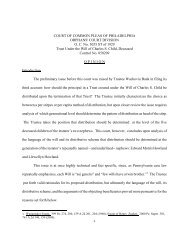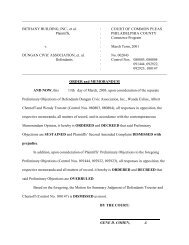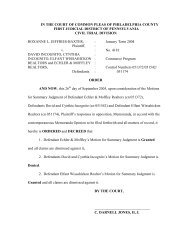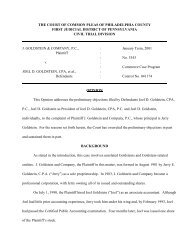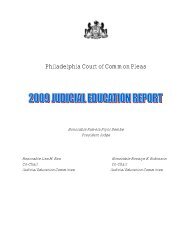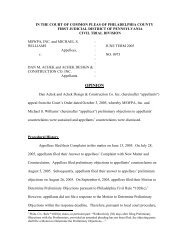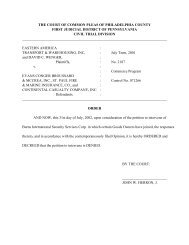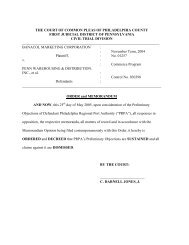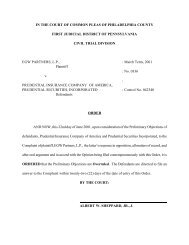in the court of common pleas of philadlephia county first judicial ...
in the court of common pleas of philadlephia county first judicial ...
in the court of common pleas of philadlephia county first judicial ...
You also want an ePaper? Increase the reach of your titles
YUMPU automatically turns print PDFs into web optimized ePapers that Google loves.
IN THE COURT OF COMMON PLEAS OF PHILADLEPHIA COUNTY<br />
FIRST JUDICIAL DISTRICT OF PENNSYLVANIA<br />
CIVIL TRIAL DIVISION<br />
EDELSTEIN & DIAMOND, L.L.P, : January Term 2004<br />
Pla<strong>in</strong>tiff, :<br />
v. : No. 1310<br />
DEAN I. ORLOFF, ESQUIRE, :<br />
Defendant. : Commerce Program<br />
:<br />
: Control Number 120187<br />
ORDER and OPINION<br />
AND NOW, this 29 th day <strong>of</strong> June 2005, upon consideration <strong>of</strong> <strong>the</strong> Motion for<br />
Summary Judgment <strong>of</strong> Dean I. Orl<strong>of</strong>f, Esquire, Pla<strong>in</strong>tiff’s response <strong>in</strong> opposition, <strong>the</strong><br />
parties respective Memoranda, all matters <strong>of</strong> record and <strong>in</strong> accord with <strong>the</strong><br />
contemporaneous Memorandum Op<strong>in</strong>ion filed <strong>of</strong> record, it hereby is ORDERED and<br />
DECREED that Defendant’s Motion for Summary Judgment is Granted as to Count III<br />
(breach <strong>of</strong> fiduciary duty) and Denied as to Count II (unjust enrichment).<br />
It is fur<strong>the</strong>r Ordered that <strong>the</strong> parties appear for a schedul<strong>in</strong>g conference/settlement<br />
conference on At <strong>in</strong> <strong>court</strong>room 676 City Hall.<br />
BY THE COURT,<br />
________________________<br />
C. DARNELL JONES, II, J.
IN THE COURT OF COMMON PLEAS OF PHILADLEPHIA COUNTY<br />
FIRST JUDICIAL DISTRICT OF PENNSYLVANIA<br />
CIVIL TRIAL DIVISION<br />
EDELSTEIN & DIAMOND, L.L.P, : January Term 2004<br />
Pla<strong>in</strong>tiff, :<br />
v. : No. 1310<br />
DEAN I. ORLOFF, ESQUIRE, :<br />
Defendant. : Commerce Program<br />
:<br />
: Control Number 120187<br />
JONES, II, J.<br />
OPINION<br />
This action arises from a failed employer/employee relationship between a law<br />
firm and associate. Presently before <strong>the</strong> <strong>court</strong> is <strong>the</strong> Motion for Summary Judgment <strong>of</strong><br />
Defendant Dean I. Orl<strong>of</strong>f, Esquire. For <strong>the</strong> reasons discussed below, Orl<strong>of</strong>f’s Motion for<br />
Summary Judgment is Granted as to Count III (breach <strong>of</strong> fiduciary duty) and Denied as to<br />
Count II (unjust enrichment).<br />
BACKGROUND<br />
Dean L. Orl<strong>of</strong>f, Esquire (“Orl<strong>of</strong>f”) was hired by <strong>the</strong> law firm <strong>of</strong> Edelste<strong>in</strong>, Lev<strong>in</strong>e,<br />
German and Diamond 1 as an associate <strong>in</strong> February 2003 to work on <strong>the</strong> firm’s pla<strong>in</strong>tiff<br />
files and on occasion to work on <strong>the</strong> defense files. The firm’s pla<strong>in</strong>tiff department<br />
consisted <strong>of</strong> approximately two hundred to three hundred files. Orl<strong>of</strong>f was required to<br />
evaluate <strong>the</strong> files, determ<strong>in</strong>e <strong>the</strong> status <strong>of</strong> <strong>the</strong> files, perform legal services on <strong>the</strong> files and<br />
determ<strong>in</strong>e whe<strong>the</strong>r <strong>the</strong> firm needed to hire a paralegal to work <strong>in</strong> <strong>the</strong> department.<br />
Thereafter, Orl<strong>of</strong>f was to discuss his recommendations with respect to <strong>the</strong> department<br />
1 At some po<strong>in</strong>t dur<strong>in</strong>g Orl<strong>of</strong>f’s employment with <strong>the</strong> firm, <strong>the</strong> firm <strong>of</strong> Edelste<strong>in</strong>, Lev<strong>in</strong>e, German &<br />
Diamond dissolved and a new entity Edelste<strong>in</strong>, Lev<strong>in</strong>e and Diamond L.L.P. was formed. Presently, <strong>the</strong><br />
firm is Edelste<strong>in</strong> & Diamond L.L.P.
with Edelste<strong>in</strong> or Cataldi and to receive <strong>the</strong>ir approval to implement any changes <strong>in</strong> <strong>the</strong><br />
department.<br />
In exchange, Orl<strong>of</strong>f was to be paid a salary <strong>of</strong> $75,000.00 annually plus health<br />
benefits, payment <strong>of</strong> park<strong>in</strong>g fees and use <strong>of</strong> <strong>the</strong> firm’s <strong>of</strong>fices and adm<strong>in</strong>istrative<br />
services. An oral agreement allegedly existed with respect to <strong>the</strong> shar<strong>in</strong>g <strong>of</strong> fees<br />
generated on cases orig<strong>in</strong>ated by Orl<strong>of</strong>f as well as files orig<strong>in</strong>ated by Richard Cataldi,<br />
Esquire, ano<strong>the</strong>r associate attorney <strong>in</strong> <strong>the</strong> law firm. 2<br />
Shortly <strong>in</strong>to <strong>the</strong> employment relationship, Jay Edelste<strong>in</strong>, Esquire, a pr<strong>in</strong>cipal <strong>of</strong><br />
<strong>the</strong> firm, became dissatisfied with Orl<strong>of</strong>f’s performance. Specifically, <strong>the</strong>re was a<br />
concern that Orl<strong>of</strong>f’s work habits were not satisfactory, that Orl<strong>of</strong>f failed to adequately<br />
manage <strong>the</strong> pla<strong>in</strong>tiff’s department and that sufficient fee monies were not be<strong>in</strong>g generated<br />
<strong>in</strong> said department.<br />
On or about October 1, 2003, Edelste<strong>in</strong> <strong>in</strong>formed Orl<strong>of</strong>f that <strong>the</strong> employment<br />
relationship was not work<strong>in</strong>g out and that <strong>the</strong> parties would need to discuss Orl<strong>of</strong>f’s<br />
future with <strong>the</strong> firm. On October 2, 2003, a similar discussion ensued. Thereafter,<br />
Pla<strong>in</strong>tiff alleges that Orl<strong>of</strong>f failed to report to work <strong>the</strong> follow<strong>in</strong>g day and for weeks<br />
<strong>the</strong>reafter and failed to communicate with Pla<strong>in</strong>tiff as to his whereabouts, <strong>the</strong> status <strong>of</strong> <strong>the</strong><br />
files he was handl<strong>in</strong>g and his <strong>in</strong>tent to return to <strong>the</strong> <strong>of</strong>fice to transition files and remove<br />
his personal property.<br />
2 The oral agreement allegedly provides that fees on cases generated by Orl<strong>of</strong>f would be shared on a 60%-<br />
40% basis with <strong>the</strong> firm receiv<strong>in</strong>g 60% and Orl<strong>of</strong>f receiv<strong>in</strong>g 40%. Any fees obta<strong>in</strong>ed on any cases<br />
generated by Richard Cataldi, Esquire would be shared on a 90%-10% basis with <strong>the</strong> firm receiv<strong>in</strong>g 90% <strong>of</strong><br />
<strong>the</strong> net fees and Orl<strong>of</strong>f receiv<strong>in</strong>g 10% <strong>of</strong> <strong>the</strong> net fees. Orl<strong>of</strong>f was also required to reimburse Pla<strong>in</strong>tiff for all<br />
costs that Pla<strong>in</strong>tiff paid on Orl<strong>of</strong>f’s files.<br />
2
Pla<strong>in</strong>tiff contends that as a result <strong>of</strong> Orl<strong>of</strong>f’s failure to perform his obligations<br />
pursuant to an at will employment relationship, pla<strong>in</strong>tiff susta<strong>in</strong>ed damages <strong>in</strong>clud<strong>in</strong>g but<br />
not limited to percentage <strong>of</strong> fees and costs that Pla<strong>in</strong>tiff was entitled to be paid <strong>in</strong><br />
accordance with <strong>the</strong> oral agreement. On January 12, 2004, <strong>the</strong> firm <strong>in</strong>stituted suit aga<strong>in</strong>st<br />
Orl<strong>of</strong>f alleg<strong>in</strong>g breach <strong>of</strong> contract (Count I), fraud (Count II), unjust enrichment (Count<br />
III) and breach <strong>of</strong> fiduciary duty (Count IV). In addition to <strong>the</strong> above, <strong>the</strong> firm also seeks<br />
an account<strong>in</strong>g.<br />
On April 6, 2004, <strong>the</strong> <strong>court</strong> overruled <strong>in</strong> part and susta<strong>in</strong>ed <strong>in</strong> part Prelim<strong>in</strong>ary<br />
Objections filed by Orl<strong>of</strong>f dismiss<strong>in</strong>g <strong>the</strong> claims for breach <strong>of</strong> contract and fraud and<br />
grant<strong>in</strong>g Pla<strong>in</strong>tiff leave to amend as it perta<strong>in</strong>ed to <strong>the</strong> breach <strong>of</strong> contract claim. Orl<strong>of</strong>f<br />
subsequently filed a motion for reconsideration request<strong>in</strong>g that <strong>the</strong> <strong>court</strong> reconsider its<br />
decision to overrule <strong>the</strong> prelim<strong>in</strong>ary objections <strong>in</strong> part which <strong>the</strong> <strong>court</strong> denied. On April<br />
26, 2004, Pla<strong>in</strong>tiff filed an amended compla<strong>in</strong>t. Orl<strong>of</strong>f once aga<strong>in</strong> filed Prelim<strong>in</strong>ary<br />
Objections which <strong>the</strong> <strong>court</strong> overruled <strong>in</strong> part and susta<strong>in</strong>ed <strong>in</strong> part.<br />
On April 25, 2005, <strong>the</strong> <strong>court</strong> denied Orl<strong>of</strong>f’s motion for judgment on <strong>the</strong><br />
plead<strong>in</strong>gs. Presently before <strong>the</strong> <strong>court</strong> is Orl<strong>of</strong>f’s Motion for Summary Judgment.<br />
DISCUSSION<br />
A. Standard <strong>of</strong> Review<br />
The law perta<strong>in</strong><strong>in</strong>g to motions for summary judgment is well settled. Once <strong>the</strong><br />
relevant plead<strong>in</strong>gs have closed, any party may move for summary judgment. Pa. R.C.P.<br />
1035.2. "Pennsylvania law provides that summary judgment may be granted only <strong>in</strong> those<br />
cases <strong>in</strong> which <strong>the</strong> record clearly shows that no genu<strong>in</strong>e issues <strong>of</strong> material fact exist and<br />
that <strong>the</strong> mov<strong>in</strong>g party is entitled to judgment as a matter <strong>of</strong> law." Rausch v. Mike-Mayer,<br />
3
783 A.2d 815, 821 (Pa. Super. 2001). Fur<strong>the</strong>rmore, "A proper grant <strong>of</strong> summary<br />
judgment depends upon an evidentiary record that ei<strong>the</strong>r (1) shows <strong>the</strong> material facts are<br />
undisputed or (2) conta<strong>in</strong>s <strong>in</strong>sufficient evidence <strong>of</strong> facts to make out a prima facie cause<br />
<strong>of</strong> action or defense and, <strong>the</strong>refore, <strong>the</strong>re is no issue to be submitted to <strong>the</strong> jury."<br />
McCarthy v. Dan Lepore & Sons Co., Inc., 724 A.2d 938, 940 (Pa. Super. 1998). The<br />
mov<strong>in</strong>g party bears <strong>the</strong> burden <strong>of</strong> prov<strong>in</strong>g that no genu<strong>in</strong>e issues <strong>of</strong> material fact exist.<br />
Rausch, 783 A.2d at 821. The trial <strong>court</strong> <strong>the</strong>n must view <strong>the</strong> record <strong>in</strong> <strong>the</strong> light most<br />
favorable to <strong>the</strong> non-mov<strong>in</strong>g party and resolve all doubts aga<strong>in</strong>st <strong>the</strong> mov<strong>in</strong>g party. See<br />
id. "Only when <strong>the</strong> facts are so clear that reasonable m<strong>in</strong>ds cannot differ, may a trial <strong>court</strong><br />
properly enter summary judgment." Id.<br />
B. Pla<strong>in</strong>tiff Has Failed to Make Out a Prima Facie Claim for Breach <strong>of</strong> Fiduciary<br />
Duty.<br />
Count III <strong>of</strong> <strong>the</strong> Amended Compla<strong>in</strong>t purports to state a claim for breach <strong>of</strong> fiduciary<br />
duty. "A fiduciary relation exists between two persons when one <strong>of</strong> <strong>the</strong>m is under a duty<br />
to act for or to give advice for <strong>the</strong> benefit <strong>of</strong> ano<strong>the</strong>r upon matters with<strong>in</strong> <strong>the</strong> scope <strong>of</strong> <strong>the</strong><br />
relation.” Restatement (Second) <strong>of</strong> Torts § 874, cmt. a (1979). A relationship <strong>of</strong> blood,<br />
bus<strong>in</strong>ess, friendship or association may give rise to a fiduciary relationship.<br />
Here, Pla<strong>in</strong>tiff alleges that Orl<strong>of</strong>f owed <strong>the</strong> firm a fiduciary duty to properly manage,<br />
<strong>in</strong> accordance with <strong>the</strong> rules <strong>of</strong> Pr<strong>of</strong>essional Conduct, <strong>the</strong> pla<strong>in</strong>tiff’s department <strong>of</strong> <strong>the</strong><br />
law firm and to handle <strong>the</strong> files for which he was responsible <strong>in</strong> a diligent, competent and<br />
pr<strong>of</strong>essional matter. (Amended Compla<strong>in</strong>t 34, 36).<br />
At this stage <strong>in</strong> <strong>the</strong> litigation, Pla<strong>in</strong>tiff may not rest upon <strong>the</strong> mere allegations or<br />
denials <strong>of</strong> <strong>the</strong> plead<strong>in</strong>gs but must file a response identify<strong>in</strong>g one or more issues <strong>of</strong> fact<br />
aris<strong>in</strong>g from evidence <strong>in</strong> <strong>the</strong> record controvert<strong>in</strong>g <strong>the</strong> evidence cited <strong>in</strong> support <strong>of</strong> <strong>the</strong><br />
4
evidence or that <strong>the</strong> evidence <strong>in</strong> <strong>the</strong> record establishes <strong>the</strong> facts essential to <strong>the</strong> cause <strong>of</strong><br />
action which <strong>the</strong> motion cites as not hav<strong>in</strong>g been produced. The <strong>court</strong> f<strong>in</strong>ds that Pla<strong>in</strong>tiff<br />
has failed to establish <strong>the</strong> facts essential to state a claim for breach <strong>of</strong> fiduciary duty.<br />
In support <strong>of</strong> its claim that Orl<strong>of</strong>f breached his fiduciary duty to Pla<strong>in</strong>tiff, Pla<strong>in</strong>tiff<br />
relies upon one fact to support its claim, namely that Orl<strong>of</strong>f was hired to run <strong>the</strong><br />
pla<strong>in</strong>tiff’s department <strong>of</strong> <strong>the</strong> law firm. Edelste<strong>in</strong> deposition pp. 11-12, 51. This fact<br />
alone is <strong>in</strong>sufficient to establish a claim for breach <strong>of</strong> fiduciary duty. Ra<strong>the</strong>r, <strong>the</strong> critical<br />
question is whe<strong>the</strong>r <strong>the</strong> relationship goes beyond mere reliance on superior skill, and <strong>in</strong>to<br />
a relationship characterized by "overmaster<strong>in</strong>g <strong>in</strong>fluence" on one side or "weakness,<br />
dependence, or trust, justifiably reposed" on <strong>the</strong> o<strong>the</strong>r side. See eToll, Inc. v. Elias/Savion<br />
Adver. Inc., 811 A.2d 10, 23 (Pa. Super. 2002). A confidential relationship is marked by<br />
such a disparity <strong>in</strong> position that <strong>the</strong> <strong>in</strong>ferior party places complete trust <strong>in</strong> <strong>the</strong> superior<br />
party's advice and seeks no o<strong>the</strong>r counsel, so as to give rise to a potential abuse <strong>of</strong> power.<br />
Id.<br />
The relationship between Pla<strong>in</strong>tiff and Orl<strong>of</strong>f does not constitute one <strong>of</strong><br />
“overmaster<strong>in</strong>g <strong>in</strong>fluence” or “weakness, dependence or trust justifiably reposed”. The<br />
facts <strong>of</strong> record establish that even though Orl<strong>of</strong>f’s duties were to manage <strong>the</strong> pla<strong>in</strong>tiff’s<br />
department, his “management” was subject to <strong>the</strong> approval from Mr. Cataldi and/or Jay<br />
L. Edelste<strong>in</strong>. (Pla<strong>in</strong>tiff’s Memo. Of Law p. 2, e-mails dated July 29, 2003(pltf cases),<br />
July 29, 2003 (what’s go<strong>in</strong>g on), July 29, 2003 (pltf files), July 30, 2003 (plts. policies<br />
and procedures)). Even <strong>the</strong> acceptance <strong>of</strong> settlement <strong>of</strong>fers on pla<strong>in</strong>tiff’s cases was<br />
subject to <strong>the</strong> approval <strong>of</strong> Edelste<strong>in</strong>. (e-mail dated August 8, 2003 (Settlement Offers for<br />
Pla<strong>in</strong>tiff cases). The record also fails to evidence that Orl<strong>of</strong>f had <strong>the</strong> ability to actually<br />
5
<strong>in</strong>d Pla<strong>in</strong>tiff or alter it’s legal relations with third parties. Hence, <strong>the</strong> <strong>court</strong> f<strong>in</strong>ds that<br />
Pla<strong>in</strong>tiff has failed to set forth sufficient facts demonstrat<strong>in</strong>g <strong>the</strong> requisite confidential or<br />
fiduciary relationship necessary to prove a claim for breach <strong>of</strong> fiduciary duty.<br />
Accord<strong>in</strong>gly, Orl<strong>of</strong>f’s Motion for Summary Judgment is Granted and Count III is<br />
dismissed. 3<br />
C. Unjust Enrichment<br />
Count II <strong>of</strong> Pla<strong>in</strong>tiff’s compla<strong>in</strong>t purports to state a claim for unjust enrichment.<br />
The elements for a claim for unjust enrichment are “benefits conferred on defendant by<br />
pla<strong>in</strong>tiff, appreciation <strong>of</strong> such benefits by defendant, and acceptance and retention under<br />
such circumstances that would be <strong>in</strong>equitable for [<strong>the</strong>] defendant to reta<strong>in</strong> <strong>the</strong> benefit<br />
without payment <strong>of</strong> value.” We<strong>in</strong>ik v. PHH U.S. Mortage Corp., 736 A.2d 616, 622 (Pa.<br />
Super. 1999). After consider<strong>in</strong>g <strong>the</strong> record evidence, <strong>the</strong> <strong>court</strong> reaches no conclusion as<br />
to whe<strong>the</strong>r a claim for unjust enrichment exists under <strong>the</strong> circumstances. Although,<br />
evidence exists <strong>in</strong> <strong>the</strong> record that an agreement was reached concern<strong>in</strong>g <strong>the</strong> splitt<strong>in</strong>g <strong>of</strong><br />
fees on cases orig<strong>in</strong>ated by Orl<strong>of</strong>f dur<strong>in</strong>g his employment with Pla<strong>in</strong>tiff, genu<strong>in</strong>e issues <strong>of</strong><br />
fact exist as to whe<strong>the</strong>r <strong>the</strong> same existed upon term<strong>in</strong>ation <strong>of</strong> <strong>the</strong> relationship between <strong>the</strong><br />
parties. See e.g. E-mails dated October 1, 2003. Based on <strong>the</strong> forego<strong>in</strong>g Orl<strong>of</strong>f’s Motion<br />
for Smmary Judgment is denied as to Count II.<br />
3 In response to <strong>the</strong> motion for summary judgment, Pla<strong>in</strong>tiff argues that Defendant’s argument regard<strong>in</strong>g a<br />
breach <strong>of</strong> fiduciary duty is barred by <strong>the</strong> rule <strong>of</strong> coord<strong>in</strong>ate jurisdiction. The <strong>court</strong> f<strong>in</strong>ds Pla<strong>in</strong>tiff’s reliance<br />
upon <strong>the</strong> rule <strong>of</strong> coord<strong>in</strong>ate jurisdiction misplaced. The coord<strong>in</strong>ate jurisdiction rule prohibits a judge from<br />
overrul<strong>in</strong>g <strong>the</strong> decision <strong>of</strong> ano<strong>the</strong>r judge <strong>of</strong> <strong>the</strong> same <strong>court</strong>, under most circumstances. There are, however,<br />
situations when <strong>the</strong> rule does not apply such as "where <strong>the</strong> motions differ <strong>in</strong> k<strong>in</strong>d, as prelim<strong>in</strong>ary objections<br />
differ from . . . motions for summary judgment, a judge rul<strong>in</strong>g on a later motion is not precluded from<br />
grant<strong>in</strong>g relief although an earlier judge has denied an earlier motion.” Ryan v. Berman, 813 A.2d 792 (Pa.<br />
2002).<br />
6
CONCLUSION<br />
For <strong>the</strong> forego<strong>in</strong>g reasons, Defendant Orl<strong>of</strong>f’s Motion for Summary Judgment is<br />
Granted as to Count III (breach <strong>of</strong> fiduciary duty) and Denied as to Count II (unjust<br />
enrichment). An Order consistent with this Op<strong>in</strong>ion will follow.<br />
BY THE COURT,<br />
_____________________________<br />
C. DARNELL JONES, II, J.<br />
7


